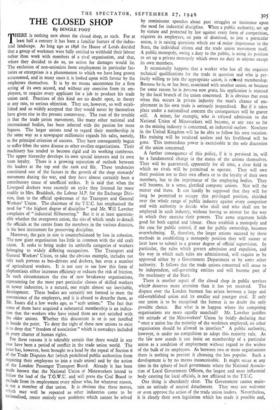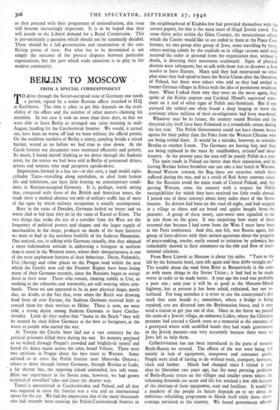THE CLOSED SHOP
By DINGLE FOOT
THERE is nothing new about the closed shop, as such. For at least half a century it has been a familiar feature of the indus- trial landscape. As long ago as 1898 the House of Lords decided that a group of workmen were fully entitled to withhold their labour rather than work with members of a rival organisation, and that, where they decided to do so, no action for damages would lie. The exclusion of non-unionists from employment in particular fac- tories or enterprises is a phenomenon to which we have long grown accustomed, and in many cases it is looked upon with favour by the employers themselves. It is by no means uncommon for a firm acting of its own accord, and without any coercion from its em- ployees, to require every applicant for a job to produce his trade union card. Practices of this kind are no doubt open, in theory at any rate, to serious objection. They are, however, so well estab- lished and so widely accepted that they would never by themselves have given rise to the present controversy. The root of the trouble is that the trade union movement, like many other national and international bodies, has been infected with the passion for mere bigness. The larger unions tend to regard their membership in the same way as a newspaper millionaire regards his sales, namely, as the principal criterion of success. They have consequently begun to suffer frbm the same disease as other swollen organisations. Their machinery has tended to become rigid and its working cumbrous. The upper hierarchy develops its own special interests and its own team loyalty. There is a growing separation of outlook between the leaders at the top and the rank and file.. These tendencies constituted one of the factors in the growth of the shop stewards' movement during the war, and they have almost certainly been a contributory cause of unofficial strikes. It is said that when the Liverpool dockers were recently on strike they listened far more readily to Mrs. Braddock, the Labour M.P. for the Exchange Divi- sion, than to the official spokesman of the Transport and General Workers' Union. The chairman of the T.U.C. has emphasised the need for " the highest degree of discipline " and Mr. Will Lawther complains- of " industrial filibustering." But it is at least question- able whether the overgrown union, the size of which tends to detach the officials at the centre from the members in the various districts, is the best instrument for preserving discipline.
Moreover, the gain in size is counterbalanced by loss in cohesion. The new giant organisation has little in common with the old craft union. It seeks to bring under its umbrella categories of workers belonging to widely differing occupations. The Transport and General Workers' Union, to take the obvious example, includes not only such persons as bus-drivers and dockers, but even a number of agricultural workers. It is not easy to see how this form of elephantiasis either increases efficiency or reduces the risk of friction. In such circumstances the rise of new breakaway organisations, representing for the most part particular classes of skilled workers in newer industries, is a natural, one might almost say inevitable, development. These bodies are certainly not formed to meet the convenience of the employers, and it is absurd to describe them, as Mr. Isaacs did a few weeks ago, as " scab unions." The fact that some of them have acquired a substantial membership is an indica- tion that the. workers who have joined them are not satisfied with the older unions. Whether this discontent is or is not justified is beside the point. To deny the right of these new unions to exist is to deny that " freedom of association" which is nowadays included in every charter of human rights.
For these reasons it is tolerably certain that there would in any case have been a period of conflict in the trade union world. The issue has, however, been brought to a head by the repeal of Section 6 of the Trade Disputes Act (which prohibited public authorities from requiring their employees to join a trade union) and by the action of the London Passenger Transport Board. Already it has been made known that the National Union of Mineworkers intend to follow the lead of the T.G.W.U. and will press the Coal Board to exclude from its employment every miner who, for whatever reason, is not a member of that union. It is obvious that these moves, Which may well be repeated as other industries come to be nationalised, create entirely new problems which cannot be solved by reminiscent speeches about past struggles or insistence upon the need for industrial discipline. When a public authority, set up by statute and protected by law against every form of competition, requires its employees, on pain of dismissal, to join a particular union, it is raising questions which are of major importance to the State, the individual citizen and the trade union movement itself. A public monopoly, owing a duty to the public, is using its position to set up a private monopoly which owes no duty to anyone except its own members.
It occasionally happens that a worker who has all the requisite technical qualifications for the trade in question and who is per- fectly willing to join the appropriate union, is refused membership. Because he is, or has been, associated with another union, or because for some reason he is persona non grata, his application is rejected by the local branch of the union concerned. It is obvious that even when this occurs in private industry the man's chance of em- ployment in his own trade is seriously jeopardised. But if it takes place under a nationalised concern the consequences will be graver still. A miner, for example, who is refused admission to the National Union of Mineworkers will become, at any rate so far as the mining industry is concerned, an industrial outlaw. Nowhere in the United Kingdom will he be able to follow his own vocation. His training will be rendered useless and his livelihood will be gone. This tremendous power is 'exercisable 'at the sole discretion of the union concerned.
A further consequence of this policy, if it is persisted in, will be a fundamental change in the status of the unions themselves. They will be guaranteed, apparently for all time, a clear field in which no rivals will be permitted to operate. They will owe their position not to their own efforts or to the loyalty of their own members, but to the imprimatur of the employing bodies. They will become, in a sense, glorified company unions. , Nor will the matter end there. It can hardly be supposed that they will for long be permitted to occupy 'this privileged position, shielded over the whole range of public industry against every competitor and with authority to decide who shall and who shall not be employed in such industry, without having to answer for the way in which they exercise their powers. The same argument holds good for both capital and labour. Once establish a monopoly and the case for public control, if not for public ownership, becomes overwhelming. If, therefore, the larger unions succeed by these methods in establishing a monopoly position they will sooner or later have to submit to a greater degree of official supervision. In particular, the rules which govern admission and expulsion, and the way in which such rules are administered, will require to be approved either by a Government Department or by some other authority. It follows that the trade unions concerned will cease to be independent, self-governing entities and will become part of the machinery of the State.
There is another aspect of the closed shop in public services
which- deserves more attention than it has yet received. The dispute over the London busmen has arisen between a large and old-established union and its smaller and younger rival. If only one union is to be recognised the former is no doubt the only possible choice. But what is to happen where the competing organisations are more equally matched? Mr. Lawther justifies tilt attitude of the Mineworkers' Union by boldly declaring that "once a union has the majority of the workmen employed, no other organisation should be allowed to interfere." A public authority, hoWevet, is under no compulsion to adopt this majority rule. As the liw now stands it can insist on membership of a particular union as a condition of employment without regard to the wishes of the bulk of its employees. As between two or more organisations there is nothing to prevent it choosing the less popular. Such a development is by no means inconceivable. It might occur at any time in the sphere of local government where the National Associa- tion of Local Government Officers, the largest and most influential body catering for local officials, is not affiliated to the T.U.C.
One thing is abundantly clear. The Government cannot main- tain an attitude of neutral detachment. They may not welcome or even approve the action of the trade union leaders. Nevertheless, it is clearly their own legislation which has made it possible and, as they proceed with their programme of nationalisation, this issue will become increasingly important. It is to be hoped that they will accede to the Liberal demand for a Royal Commission. This is pre-eminently a question which should not be summarily decided. There should be a full .presentation and examination of the con- flicting points of view. For what has to be determined is not simply the outcome of the present disputes between particular organisations, but the part which trade unionism is to play in the modern community.



























 Previous page
Previous page